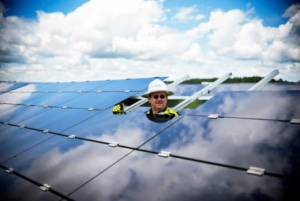The North Carolina Legislature is considering a bill that would bring more than 7 GW of new renewable energy capacity to the state in just under nine years. But it would come with major rate hikes and gigawatt-scale investment into new gas-fired power capacity.
The bill, House Bill 951, has been criticized as being too favorable to Duke Energy, as it would cut down the oversight that state regulators have over Duke’s spending. For renewable energy advocates, the bill’s enticing levels of procurement don’t outweigh its flaws.
The bill is founded on four key actions: early coal plant closures, investment in new gas generation, investment in new renewable generation, and multi-year rate plans.

The bill calls for the closure of the remaining units of the Allen Coal Plant on or before Dec. 31, 2023; the Marshall Units 1 and 2 on or before Dec.r 31, 2026; the Roxboro Plant on or before Sept. 1, 2024; Cliffside Unit 5 on or before Sept. 1, 2027; and the Mayo Plant on or before Sept. 1, 2027
The bill calls for procuring a natural gas-fueled simple-cycle combustion turbine generating facility at the Marshall site with a generating capacity of around 900 MW. The site of the Allen Plant would be home to a 20 MW/80 MWh battery energy storage system. The other sites would host unspecified storage systems of undetermined capacity.
These additions alone won’t be enough to match the total lost capacity. The bill also calls on the state’s investor-owned utilities to procure 7,327 MW AC over a term of 106 months, beginning when the state’s Public Service Commission approves the program. The utilities are expected to conduct an annual procurement of approximately 777 MW each calendar year beginning in 2021 and concluding in 2026.
Even with these capacity additions, HB 951 falls short of Gov. Roy Cooper’s call for 70% decarbonization of the power sector by 2030.






